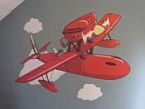Bullwinkle58
Posts: 11302
Joined: 2/24/2009
Status: offline

|
quote:
ORIGINAL: jmalter
hmm, my take on HST sez, he wouldn't give Stalin a bent nickel, post-Yalta. and he had the successful Trinity test in his pocket. no way he'd've approved USN assets putting Red Army troops into the HI. If Trinity had failed, and the Kyushu invasion was stalemated, then HST might've grudgingly put a few USN amph-assault assets at the service of Red Army ops in the Kuriles.
HST was canny, i'd guess he was just as worried about 'Joe taking root' as was the IJHQ command.
despite the overwhelming Soviet victories in Manchuria, the final defeat of IJ has always been acknowledged as a wholly-owned product of US power-projection and tech prowess, w/ subsidiary help from allied forces.
also, i love to read D McC's books, 'Path between the Seas' is my fave. i enjoyed 'The Greater Journey' & look forward to a re-read.
In my game I had dropped five A-bombs already and strangely the Japanese hadn't surrendered. I was far past auto-victory. I was far past auto-victory.
It's easy to say HST would have kept the Russians out, but if he had allowed a half-million US KIAs when the Soviets offered troops I think he would have been impeached. In my undergrad days I did extensive research into contemporary media in 1945 and HST was facing a race with US public war weariness to a far greater extent than is acked these days. He also had immense economic pressure building behind the dam for consumer products, industry change-over go-aheads, and a widespread assumption that there would be a deep recession when war contracts ended and industry down-shifted to convert. It was so widely assumed this would happen it was a truism in public discourse. We were scraping the bottom of the military manpower bucket, and VE Day was months in the past. The public wanted to know why the war wasn't over when The War had been over since May. HST had very limited political maneuvering room to delay or to lose men, the Cold War notwithstanding. The Soviets had already reniged on free elections in Poland, but the true extent of Soviet post-war plans was not wholly apparent. The Greek civil war and the Iron Curtain speech by Churchill were still a couple of years in the future.
The US public did not see any long-term upside to occupying Japan either. They didn't care if it was all us, or us with help. They wanted it over, as cheaply as possible. The usefulness of Japan as a Cold War bulwark in the Korean War and after was also well in the future. I doubt Stalin would have promised troops in the quantity I used. But if the war had gone into 1946 I think he would have invested substantial numbers in order to stake a claim to Japanese real estate. Where the Red Army went it did not withdraw, until 1989. And I believe the USN would have carried those forces across the water. The political pressure at home on Truman would have been immense.
_____________________________
The Moose
|
 Printable Version
Printable Version






 I was far past auto-victory.
I was far past auto-victory. 

 New Messages
New Messages No New Messages
No New Messages Hot Topic w/ New Messages
Hot Topic w/ New Messages Hot Topic w/o New Messages
Hot Topic w/o New Messages Locked w/ New Messages
Locked w/ New Messages Locked w/o New Messages
Locked w/o New Messages Post New Thread
Post New Thread